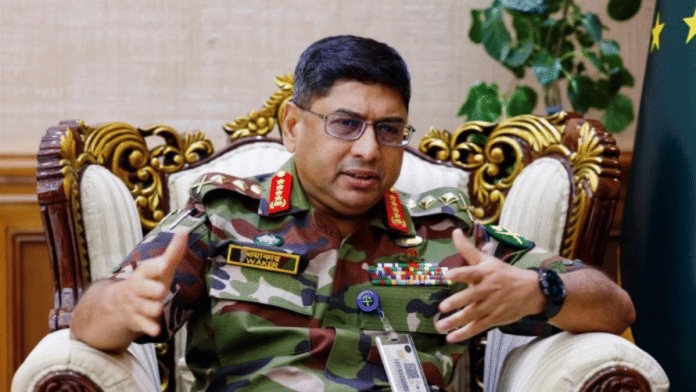New Delhi: Bangladesh Army chief Waker-Uz-Zaman has cancelled his four-day Saudi Arabia visit, as the army detained 14 serving officers acting on arrest warrants by the International Crimes Tribunal (ICT) of Bangladesh in connection with alleged crimes against humanity during former prime minister Sheikh Hasina’s 15-year rule.
The warrants named 32 individuals, including Hasina, her military secretary major general Kabir Ahmed, and several current and former security officials in connection with the allegations of abduction, torture, and enforced disappearances.
The detentions are among the most extensive within the armed forces in Bangladesh. Now, the Army chief Waker-Uz-Zaman has reportedly cancelled his four-day Saudi visit.
At a meeting on 9 October, just a day after the ICT order, several officers reportedly expressed open dissent over plans to detain army personnel accused of human rights violations under the previous government. Four generals reportedly warned that large-scale arrests could fracture the cohesion within the force.
General Zaman had earlier postponed a planned trip to New Delhi, initially set between 12 and 14 October. His Saudi visit was expected to focus on discussions over a potential peacekeeping deployment in a region currently hosting around 7,000 U.S. troops, who are expected to withdraw in the coming months.
Bangladesh, one of the world’s largest contributors to United Nations peacekeeping operations, had viewed the talks as an opportunity to expand its global footprint.
At a press conference Saturday, Maj. Gen. Md Hakimuzzaman, an army spokesperson, confirmed that the detained officers were in army custody “as part of the legal process”.
He said that while many of those charged were serving in other forces, such as the Rapid Action Battalion and the Directorate General of Forces Intelligence “they are members of the army, and therefore the army is taking responsibility”.
But the army’s announcement that the officers were in custody rather than formally “under arrest” has raised questions about due process and whether the military is attempting to assert control over how the prosecutions unfold. If arrested, the officers would have to be produced before a special court within 24 hours.
The detained officers are expected to face initial hearings before the Dhaka-based ICT on 22 October, which will determine whether they are to be released on bail or remanded for further questioning.
The chief of the special tribunal, Mohammad Tajul Islam, said Sunday that his court had not yet been officially informed of the detentions. “Since no one has officially informed us through documentary procedure that the person has been detained, we are not taking into account what has appeared in the media,” he told reporters.
Asif Bin Ali, a geopolitical analyst and doctoral fellow at Georgia State University, told ThePrint, “The recent moves by the International Crimes Tribunal have brought Bangladesh to a difficult but necessary crossroads.”
“The tribunal is investigating, the court is issuing warrants, and the army is cooperating within the law. But social media noise risks turning this into an army-versus-public narrative.”
Ali warned that politicising the trials could destabilise institutions further. “Justice is not a talk show,” he said. “It relies on evidence, signatures, and chain of command—work that requires patience. A uniform is not a cloak of impunity, but nor should the entire institution be put on trial.”
Meanwhile, a four-member team of the Indian Army’s Military Intelligence Unit will be in Dhaka on a two-day visit between 14 and 16 October. This will be the first major visit by a critical Indian Army unit since 8 August 2024, when the interim government led by Mohammad Yunus took charge in Dhaka.
In July, the ICT formally indicted Hasina on charges of crimes against humanity. The charges stem from her government’s response to the widespread anti-government demonstrations in July and August of 2024.
Hasina was ousted on 5 August 2024, ending her nearly 16-year tenure. In December 2024, the Muhammad Yunus-led interim administration in Bangladesh sent a diplomatic note to India, requesting her extradition. The Ministry of External Affairs confirmed the note but has not responded so far.
The ICT of Bangladesh, originally established by the Hasina government in 2009 to try those responsible for the 1971 Liberation War atrocities, was reconstituted in 2024 by the interim Yunus administration following Sheikh Hasina’s resignation. The revamped tribunal, now with six judges across two benches, has been tasked with prosecuting those accused of orchestrating the killings during the July protest.
(Edited by Ajeet Tiwari)
Also Read: Coup rumours are circulating in Dhaka. Here’s why the army isn’t keen on it






